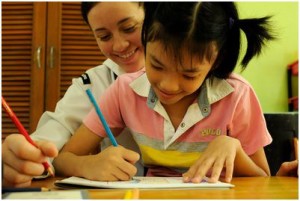 What are visual motor and visual perceptual skills? Visual perceptual skills can be defined as the skills necessary for your brain to make sense of what you see. Children who experience difficulty with visual perceptual skills may struggle with identifying letters or shapes, completing puzzles, or completing math problems. A young child with visual perceptual issues may avoid participating in art activities (e.g., drawing or cutting with scissors) and building activities (e.g., working with blocks).
What are visual motor and visual perceptual skills? Visual perceptual skills can be defined as the skills necessary for your brain to make sense of what you see. Children who experience difficulty with visual perceptual skills may struggle with identifying letters or shapes, completing puzzles, or completing math problems. A young child with visual perceptual issues may avoid participating in art activities (e.g., drawing or cutting with scissors) and building activities (e.g., working with blocks).
At school, a child with visual perceptual difficulties may have a hard time with reading, writing, drawing, and math. The formation of letters and sentences may feature disconnected letters and drawings may appear immature in comparison to other children his or her age. School age children and teenagers who experience visual perceptual deficits may also experience some anxiety regarding their hardships with reading, writing, and math.
Visual Motor skills allow a child to visually and cognitively process shapes, sequences, figures, and three dimensional objects around them. Visual motor skills integrate visual skills, visual perceptual skills, and motor skills. These skills are demonstrated when a child catches a baseball, kicks a soccer ball or produces legible handwriting. Children who have difficulty with visual motor skills do not have a vision problem; rather, their vision is working correctly but their brain is processing visual cues incorrectly. Signs that a younger child is having difficulty with visual motor skills include trouble recognizing patterns, similarities and differences, have difficulty with puzzles, or have trouble drawing simple shapes.
These children read better aloud, have trouble remembering what they see, and present as disorganized and sloppy in their written work. They may also reverse their numbers and letters (past the age that it is typical for young children to reverse their letters and numbers) and often mix up letters when spelling words. Children who struggle with visual motor skills may feel exhausted and frustrated by schoolwork and daily tasks because of these continual difficulties. Motor planning skills, where a child needs to think about and organize their large and small scale movements are often needed in handwriting and copying.
Psychologists will test a child’s visual motor skills by asking them to copy simple and complex shapes (either with a model or from memory), provide a writing sample, or work with colored blocks to match a model pattern.
Assessing visual motor and visual perceptual skills is often done using tests like the Bender-Gestalt II, Beery Visual Motor Integration, and the Rey-Osterrieth Complex Figure Test. These particular tests require the child to copy drawings of figures that range in difficulty. Other tests of visual perception involve constructing blocks to make a particular design or the analysis of a handwriting sample.
The following research provides additional information regarding the influences of visual motor and visual perceptual skills on handwriting performance as well as suggestions for the integration of visual perceptual skills in handwriting at home and school.
For More Information On Visual Perceptual Skills, Please Visit The Following Links:
What Are Intelligence Tests? : A post published by Ellen Braatan, Ph.D. She explains what exactly are intelligence tests and why they are important in a brief overview, then continues to explain certain tests in more specific detail.
Handwriting Needs Perceptual and Visual Motor Skills: This short article explains the correlation between handwriting and visual perceptual skills in brief, explains what visual perceptual skills actually mean, and details the development of a child’s visual motor skills according to their age level.
Visual Perception: This online article explains what visual perception is, why it’s important, how to recognize if a child is having difficulties with their visual perception, and ways to help the child improve their visual perception skills.
Motor Planning Skills: An excellent description of how to understand the relationship between sensory experiences and new physical and motor activities. This helps to understand the struggles some kids have with Writing and copying.
Motor Skills and Developmental Disorders: This article discusses a variety of ways that gross and fine motor issues impact children.
Photo Credit: Official U.S. Navy / CC BY 2.0
Receive online class information and helpful tips from Dr. Randy Kulman's LearningWorks for Kids |




